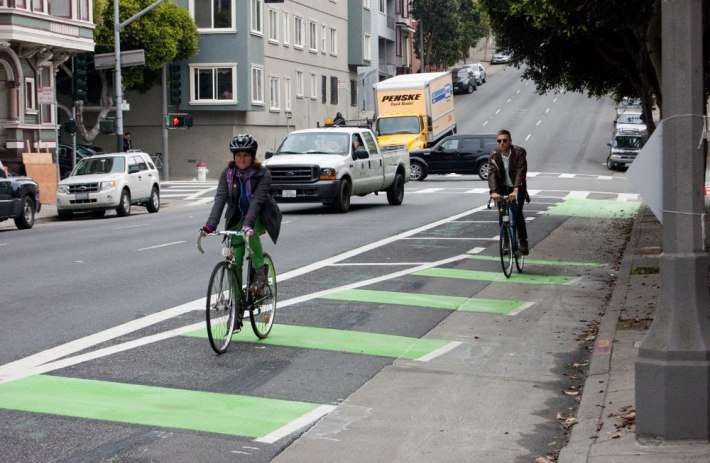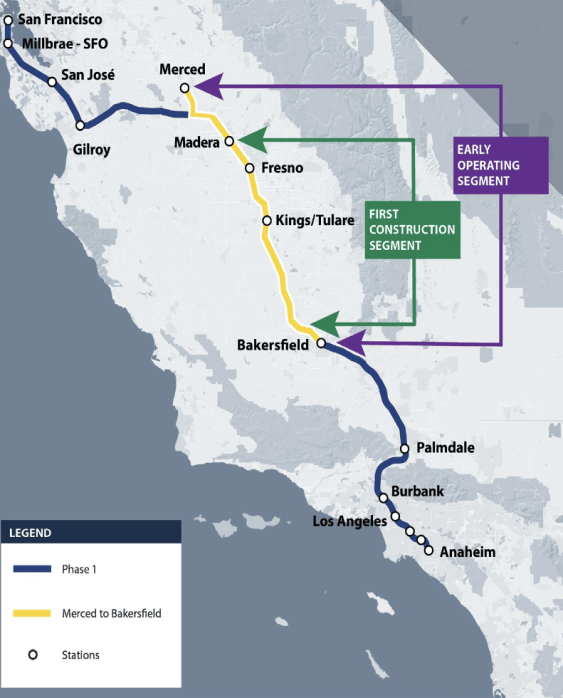Supes Reject Legal Appeal Against Fell/Oak Bikeways and Ped Upgrades
4:47 PM PST on December 12, 2012
A legal appeal filed against protected bike lanes and pedestrian safety upgrades on three blocks of Fell and Oak Streets was rejected unanimously by the Board of Supervisors yesterday. Construction on the project, currently underway the SF Municipal Transportation Agency beginning with the Fell Street protected bike lane, will not be halted by the appeal.
Supervisors dismissed the opponents' claims that the project required an environmental impact report (EIR) under the California Environmental Quality Act, which could have added a year or more to the project. In a statement, the SF Bicycle Coalition hailed the board "for voting to uphold the city’s thorough work, and against creating a precedent that curb extensions and bikeways require an unprecedented and unreasonable amount of environmental review."
The appeal [PDF], largely seen as a gambit to slow the project, was filed by Mark Brennan, a developer who owns a building on Oak and Divisadero Street; Howard Chabner, a disability rights advocate; and Ted Loewenberg, president of the Haight-Ashbury Improvement Association. Another appeal could be filed at the state level, though it's unclear if the opponents plan to do so.
At issue was the Planning Department's determination that the project didn't require an EIR under CEQA because it only includes "minor alterations" to existing streets and won't remove traffic lanes, except for a part-time turning lane on Oak.
The project will re-purpose about 100 on-street car parking spaces from Fell and Oak to create protected bike lanes separated from motor traffic by concrete planters (while replacing about half of those spaces on nearby streets). Much of the striping work on Fell is already done.
Although CEQA doesn't require an EIR for any of the changes in the project, since they're considered "minor alterations" to the street, Chabner argued that they go beyond that definition when taken altogether, and that the impacts of a separate plan to overhaul nearby Masonic Boulevard should be considered as well.
Supervisors and advocates disagreed. Supervisor David Chiu said the clause that includes exemptions for bicycle lanes is separate from the clause that lists exemptions for "minor alterations."
"It seems to me that you're reading into a requirement in the code that simply isn't there," said Chiu.
Walk SF Executive Director Elizabeth Stampe said upholding Chabner's appeal would slow the already arduous process of implementing crucial street safety improvements. "A reversal of the exemption would really set a bad precedent, forcing full reviews on traffic-calming projects, even small-scale fixes like bulb-outs, as well as other sustainable design improvements," she said. "We need safer streets sooner, not with more delays."
Supervisor Scott Wiener questioned the legal implications of defining the removal of car parking as an environmental impact under CEQA. "If you require an EIR to remove net 55 parking spots, what about adding net 55 parking spots?" he said. "What about taking a surface parking lot, if I buy it, and I decide to develop a building there -- would that require a full EIR for a two or three story building?"
While the hearing was held strictly to address the issue of the project's exemption from an EIR, opponents also made arguments against the merits of the project itself (though Wiener urged them to keep the discussion on topic). Lowenberg repeated his assertion that bicycle commuters should instead be forced on to existing alternative routes via Hayes and Page Streets.
SFMTA Project Manager Luis Montoya pointed out, again, that most people aren't willing to use those routes, since they require climbing uphill at a 12 percent grade and increase the trip's distance by 20 percent. "This project has been on the front minds of this neighborhood for decades," he said. "People in this neighborhood and people who move throughout the city have said these streets don't feel safe, they don't feel comfortable, please do something about it."
Montoya said the issues the appellants complained about were analyzed, and that claims like the idea that corner bulb-outs will create car congestion by forcing drivers to make safer turns simply aren't true. "Yes, hopefully they will be slowing down to increase safety, but it's not in any measurable way that is going to increase congestion," he said.
Advocates argued that, contrary to the appellants' claims, the improvements would have only positive impacts on walking and biking.
"There's no significant impact on automobile intersection Level of Service," said Jason Henderson of the Hayes Valley Neighborhood Association. "As much as I would like to get us away from using that metric, I do understand that metric, and this project has thoroughly looked at that."
Lawrence Li of the Lower Haight Merchants and Neighbors Association told the board many residents were eager to see the project improve access to the neighborhood. "Delays to this project would be harmful to our safety, and we're quite concerned about that," he said.
The board's unanimous vote was "encouraging," said Li, adding that it seems to reflect a "frustration that the board is feeling around the CEQA process, which makes these kinds of common-sense improvements take way too long."
Supervisor Wiener recently proposed legislation intended to reduce abuses of CEQA -- a state law -- as a tool for opponents to slow street improvement and development projects. However, the proposal was heavily criticized for giving too much leeway to developers and was rejected by the Planning Commission, which asked him to bring back a revised proposal next year.
Supervisor Sean Elsbernd, for whom yesterday's meeting was his last as a member of the board, noted the relevance of Wiener's proposal to the hearing. "If there's any reason to support his efforts on CEQA reform," he said, "this last hour-and-a-half should be something that you keep in your memory banks as you consider that legislation next year."
Read More:
Stay in touch
Sign up for our free newsletter





